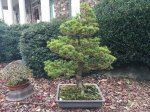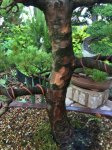Young JWP have that smooth light grey bark. Old JWP have flaky bark, and even older JWP will develop the rough plated bark structure that is highly prized by pine enthusiasts.
One of the advantages JBP has over JWP is its tendency to make rough bark at a much earlier age than JWP. There's little we can do other than wait for it to happen. Do not try to scar JWP smooth bark, or anything like that. It just makes the situation worse!
EXCEPT...
There is a "one time window" for each tree when we can do something to help move the process along! It happens when the JWP is about 20 years old. It begins to "shed its skin". The smooth bark begins to detach itself, and curl back on its own. It will only do this after it has built a layer of more mature bark underneath. The old smooth bark seems to be a rather solid protective covering that appears to constrict the trunk growth. Once the trunk sets strong, it puts on mature bark and begins to thicken faster.
Ok, so what do we do?
Once the tree begins to "shed" we can help the process along and peel off the loose sections. If the bark is still tightly bound, leave it alone! So, when I say, "one time only", I mean, for each section of bark. Don't peel any of the mature bark later. The idea is to help the tree shed that initial grey bark.
So, here's a Zuisho I bought from Julian Adams last December. When I bought it, it had begun the shedding, as you can see down at the base on the right.

You can see where a large piece has separated at the base. A little higher up in the middle front, there's a spot about the size if a quarter that appears to be more red. That's the mature bark. The old grey bark has already fallen off. Above that, you can see the old "grey" bark. It actually has a green tint from moss and algae.
So, I didn't do anything to the tree until March. The tree was half bare rooted to transition it from Julian's turface to my Boon Mix, I did significant root work to induce rooting on one side of the trunk, and I began the "peeling" process. I'm sorry, I don't have that documented. I was at the "Redneck Study Group" in Charlotte with Boon, and that was where I learned about it.
The technique is simple, once the tree begins the process on its own, as this one has, go around the trunk and where you see sections of the grey bark that's lifted off the trunk, peel it off with a fingernail. It just kinda pops off. If you have to dig at it, it's not ready. Leave it.
The bark underneath will be reddish and smooth. Over time, this will develop vertical lines, and become flaky.
Every three months or so, revisit the tree, and see if more sections are ready to be peeled.
Here is a picture of the tree this morning.

So, right now, it's half and half. The lighter tan, I just peeled. The darker red areas are what I peeled back in March. There's still sections of the juvenile bark that are still firmly attached. I'll check again at the end of the summer when it's time to wire.
If in doubt as to whether your tree is ready, don't do it. It's not ready! When the tree has already sluffed some off on its own, THEN it's ready! Remember the red spot my tree had? The tree did it all on its own. It might take a year or two before my tree has shed all the old bark on the lower section of the trunk.
And, up near the apex, that part is younger, so it's not ready yet. As yet, none of the branches have shown any signs of being ready to peel, either.
One of the advantages JBP has over JWP is its tendency to make rough bark at a much earlier age than JWP. There's little we can do other than wait for it to happen. Do not try to scar JWP smooth bark, or anything like that. It just makes the situation worse!
EXCEPT...
There is a "one time window" for each tree when we can do something to help move the process along! It happens when the JWP is about 20 years old. It begins to "shed its skin". The smooth bark begins to detach itself, and curl back on its own. It will only do this after it has built a layer of more mature bark underneath. The old smooth bark seems to be a rather solid protective covering that appears to constrict the trunk growth. Once the trunk sets strong, it puts on mature bark and begins to thicken faster.
Ok, so what do we do?
Once the tree begins to "shed" we can help the process along and peel off the loose sections. If the bark is still tightly bound, leave it alone! So, when I say, "one time only", I mean, for each section of bark. Don't peel any of the mature bark later. The idea is to help the tree shed that initial grey bark.
So, here's a Zuisho I bought from Julian Adams last December. When I bought it, it had begun the shedding, as you can see down at the base on the right.

You can see where a large piece has separated at the base. A little higher up in the middle front, there's a spot about the size if a quarter that appears to be more red. That's the mature bark. The old grey bark has already fallen off. Above that, you can see the old "grey" bark. It actually has a green tint from moss and algae.
So, I didn't do anything to the tree until March. The tree was half bare rooted to transition it from Julian's turface to my Boon Mix, I did significant root work to induce rooting on one side of the trunk, and I began the "peeling" process. I'm sorry, I don't have that documented. I was at the "Redneck Study Group" in Charlotte with Boon, and that was where I learned about it.
The technique is simple, once the tree begins the process on its own, as this one has, go around the trunk and where you see sections of the grey bark that's lifted off the trunk, peel it off with a fingernail. It just kinda pops off. If you have to dig at it, it's not ready. Leave it.
The bark underneath will be reddish and smooth. Over time, this will develop vertical lines, and become flaky.
Every three months or so, revisit the tree, and see if more sections are ready to be peeled.
Here is a picture of the tree this morning.

So, right now, it's half and half. The lighter tan, I just peeled. The darker red areas are what I peeled back in March. There's still sections of the juvenile bark that are still firmly attached. I'll check again at the end of the summer when it's time to wire.
If in doubt as to whether your tree is ready, don't do it. It's not ready! When the tree has already sluffed some off on its own, THEN it's ready! Remember the red spot my tree had? The tree did it all on its own. It might take a year or two before my tree has shed all the old bark on the lower section of the trunk.
And, up near the apex, that part is younger, so it's not ready yet. As yet, none of the branches have shown any signs of being ready to peel, either.
Last edited:

